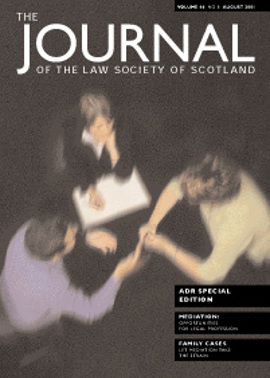The Falkirk experience
At Falkirk, Sheriff Sheehan and his colleagues preside over a court where mediation is encouraged as a route to resolving family disputes.
“The adversarial nature of proceedings in court means parties often become entrenched, giving rise to bitterness. After all is said and done those involved must get on with the situation they are left with following divorce. Mediation can assist in reducing aggression between parties, and this is particularly important where children are involved.”
Mediation can allow them to reach a compromise in the best interests of children, who are otherwise all too often dragged in to an adversarial case, with the risk that each parent may ask them to take sides.
“The interests of children are paramount, and it can be difficult for a sheriff to know where these interests lie within the parameters of what he or she can assess within the framework of formalised court procedures.
“Parties are often bitter about each other, the case may give rise to strong feelings and parties may resort to saying things to strengthen their own case. Sheriffs must make a decision in what are often acrimonious cases and will usually try to retain some form of contact between the children and both parents, and so it’s better to ask them to go away and co-operate as much as they can.”
In practice, Sheriff Sheehan will ask at an early stage of the case, if not in chambers then at a Child Welfare Hearing or Options hearing, if there is any possibility of mediation.
It’s an approach that seems to go down well among practitioners operating in Falkirk Sheriff Court. “Most solicitors in Falkirk have similar views, and prefer to see mediators try to assist in resolving cases.”
Gordon Addison, Secretary of the local Faculty, says there is a saying at Falkirk “has this case been Calmed yet”.
“ The Court refers as many family cases to mediation as possible not because of some sort of altruistic approach, but because it has a high success rate of resolving matrimonial disputes at an early stage, which must be better for clients.”
So why is Falkirk the mediation centre of Scotland?
“It’s a combination of the type of solicitor we have, in particular good quality family lawyers and an enlightened bench who have been keen to give it a try and make it work”, said Gordon Addison.
Anecdotally, 75-80% of cases are settled without recourse to proof, or at least some of the contentious issues are resolved and don’t come before the sheriff. The advantages are obvious for all concerned.
“If it goes through as undefended, the divorce will generally be quicker, less unpleasant and aggressive, and might be cheaper”, said Sheriff Sheehan.
Mediation can’t be imposed and isn’t appropriate in every situation, where for example, there is an allegation of violence.
“If a case is mediated through CALM or FMS, the advantage is that parties can take as long as they need and are not restrained by formalities of court procedure and language.”
Before referring parties to mediation the sheriff will explain the procedure involved, whereby after the mediator is appointed, they will be interviewed to explore the issues in dispute. Each party will retain his or her own legal adviser and needn’t agree to anything without consulting them. If they do reach agreement, a joint minute can be submitted. He stresses throughout that it is an optional process; parties are not bound to accept anything during mediation and that if nothing can be agreed the case will proceed in court in the normal manner.
Sheriff Sheehan would also like to see mediation introduced in other types of civil litigation such as small claim or summary cause actions and even in some ordinary actions where, for example, the sum in dispute is only marginally above the £1,500 limit.
“It seems absurd to litigate in court where the legal expenses can quickly and easily escalate to a level far in excess of the sum sued for.”
But isn’t it in the profession’s interests to stimulate litigation and bolster their fee income?
“I don’t think solicitors are influenced by fear of reduced fees. In my experience they are dedicated to seeking the best solution for their client.”
Gordon Addison also rejects the notion of solicitors having an incentive to keep on litigating.
“ It’s wrong to criticise a successful process because it might reduce the fee. The profession had a fear of ADR but people still have to see their solicitor for legal advice and if you look at it from the profession’s perspective, mediation in fact involves three solicitors, not just two.”






